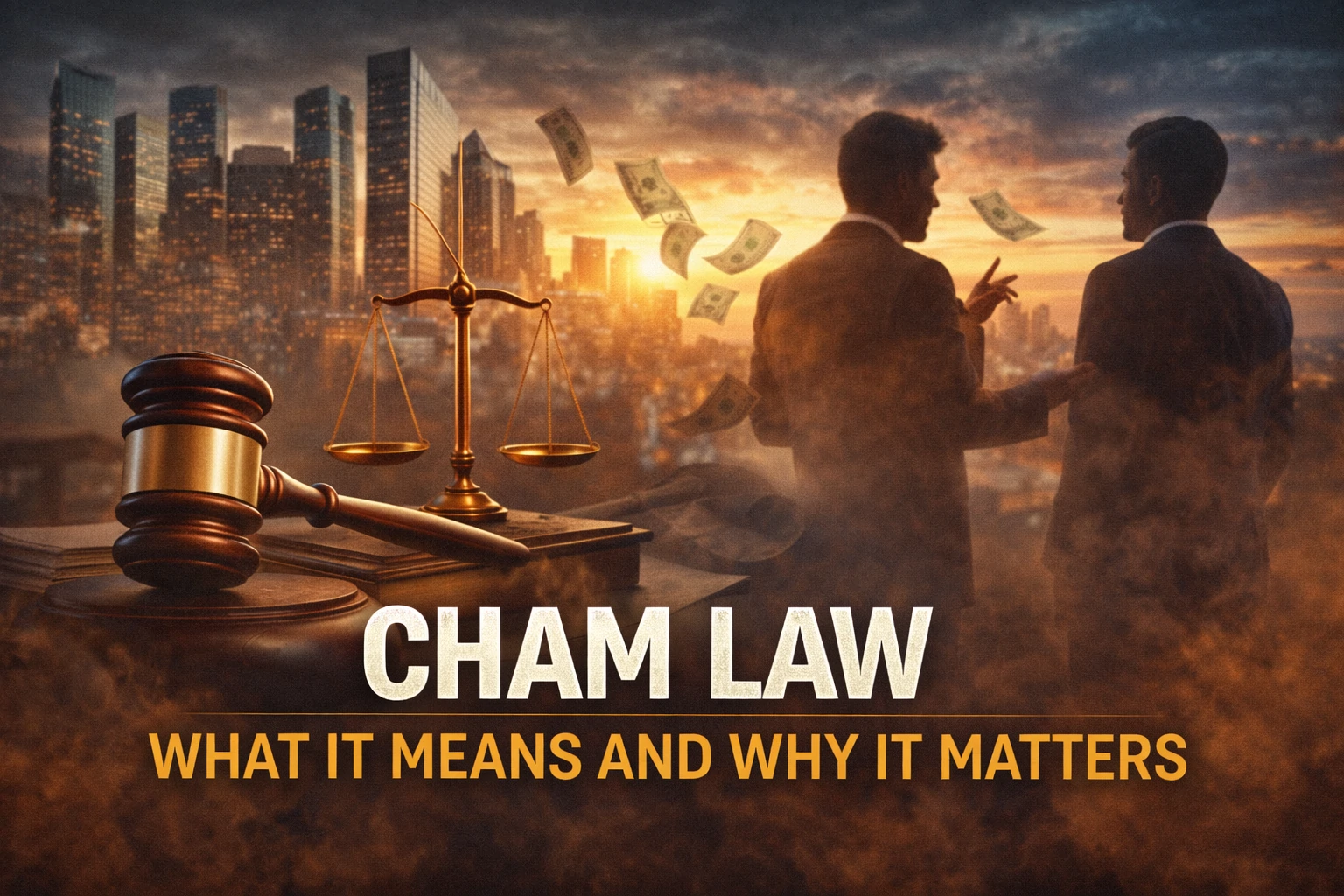Legal terms often confuse the average person. Some rules sound old odd or even unfair. Cham law is one of them. Many people have never heard of it. Yet it plays a role in how courts handle certain lawsuits, especially when third parties step in to fund or control them.
You may think “What does an old legal rule have to do with today’s cases?” A lot, actually. Cham law is about fairness and control. It tries to stop people who have no real interest in a case from taking it over. Courts want to make sure lawsuits stay between the right parties.
This guide explains Cham law in simple terms. It covers what it means, where it started, and how it works now. You will also see how it ties to legal funding today. Some states still follow parts of it.
Understanding Cham Law Basics
Cham law comes from the word “champerty.” It refers to a deal where someone not involved in a lawsuit gives money or help to one side. In return, they ask for a share of the money if that side wins. That sounds a lot like third-party funding, but there’s a legal line.
Under traditional Cham law, this type of deal was not allowed. Courts said it was unfair and led to problems. They did not want rich people or outsiders to push others into lawsuits just to make money. The goal was to stop false claims, fraud, and abuse of the legal system.
Cham law is part of a group of old rules called “maintenance,” “barratry,” and “champerty.” Maintenance means helping a lawsuit without a legal reason. Barratry means pushing others to sue all the time. Champerty is the deal made to gain profit from helping. These three ideas work together under old common law.
How Cham Law Began
Cham law started in England hundreds of years ago. In those times, noble families or wealthy landowners would fund lawsuits. They did not care about the truth. They just wanted to use the legal system for gain. Courts saw this and said, “No more.”
As time passed, the English common law brought these ideas to the U.S. American courts adopted Cham law and used it in many cases. They wanted to stop lawsuits built on greed or control. They believed the legal system should protect real claims, not turn into a business tool.
In some places, Cham law stayed strong. In others, it slowly faded. Judges began to see that not all funding or help was bad. Some people needed support to fight fair battles in court. The view of Cham law began to shift with time.
Cham Law Today: Is It Still Used?
The answer is both yes and no. Some states still follow Cham law in full. Others have changed their laws or dropped it completely. Courts now look at the facts of each case to decide.
In most states, third-party funding is allowed. But it must follow clear rules. If someone funds a lawsuit only to take control or earn a big return, courts may step in. The focus is on fairness, not just profit.
Even in states where Cham law is not strict, it still influences legal thinking. Lawyers must stay honest. Clients must not lose their voice. Courts want to make sure the case stays in the hands of the real party.
Why Some States Keep Cham Rules
Some states believe Cham law protects the courts. It stops rich groups from using poor people as tools. It keeps the focus on justice, not money. These states fear that third-party deals may harm the legal system.
They also worry that outside funders may hurt settlement talks. A person who gives money may not want to settle early. They may push the case to trial to get more money back. That can make lawsuits longer, harder, and more costly.
These fears make some lawmakers support Cham laws. They feel that banning certain funding deals keeps lawsuits clean and fair. They want the real parties in a case to stay in charge.
Legal Funding and Court Concerns
In recent years, legal funding has grown fast. Many companies now offer to fund lawsuits in exchange for a share of the money later. This helps people who cannot afford lawyers. It gives access to justice.
But this rise also brings risks. Not all deals are fair. Some funders demand too much control. Some ask for high returns. Others hide terms or avoid rules. These problems raise new questions about Cham law.
Courts now must decide: when does help cross the line into harm? What rules must legal funders follow? Should lawmakers create new laws to balance justice and business? These issues keep the debate over Cham law alive.
Cham Law and Consumer Lawsuits
Cham law often comes up in personal injury and consumer cases. A person may suffer harm and want to sue. But they cannot afford the case. A legal funder steps in with money for lawyers, doctors, and court fees.
This sounds helpful. But if the funder controls the lawyer or demands too much money back, it may break the rules. Courts may say the deal is void. The person may lose part of their award or the right to sue at all.
That is why lawyers and clients must read funding deals with care. They must check if the deal gives up too much control. They must ask if the terms help or hurt the case. Cham law plays a role in that check.
Is Cham Law Fair or Outdated?
Some experts say Cham law is old and unfair. They say it blocks access to justice. Many people do not have money to fight a case. Without help, they lose before they start. These experts want courts to drop Cham laws.
Others say the rule is still useful. It stops bad players from using poor people. It protects the court from fake lawsuits. It keeps power in the hands of the real party. These experts want to keep Cham law, or at least part of it.
The truth may lie in the middle. Cham law still warns us about greed and control. But times have changed. Courts now face complex deals and global funders. New rules may be better than a full ban or no rules at all.
Learn how legal leadership shapes ethical practices in this post on Justin Billingsley at Greene Law.
How Courts Handle Cham Law Disputes
When courts see a champerty issue, they ask key questions:
- Did the third party fund the case?
- Did they gain control over the lawyer or the claim?
- Was the deal fair and open?
- Did the client still make final decisions?
If the answer shows control or greed, courts may void the deal. But if the help looks fair and needed, the court may allow it. This balanced approach helps protect both justice and access.
Some states now even license legal funders. Others ask them to follow disclosure laws. The goal is to keep deals honest, not to ban them all.
How to Avoid Cham Law Problems
If you plan to fund or accept funds for a case, follow these tips:
- Read all terms clearly.
- Keep control in the client’s hands.
- Do not allow funders to choose the lawyer.
- Stay open with the court if needed.
- Talk to a licensed attorney about the risks.
Taking these steps can help you avoid champerty claims. It can also protect your rights in the lawsuit.
Why Cham Law Still Matters
Cham law may sound like a rule from the past, but it still shapes many legal choices today. It draws a clear line between fair help and harmful control. Courts use it to stop unfair deals and protect the goal of justice.
Legal funding grows fast. More cases will test the limits of champerty. Lawmakers and judges may change the rules. Still, the heart of Cham law stays strong. Lawsuits must stay honest, and power must stay with the right party.
If you deal with a lawsuit, speak to a trusted lawyer. Do not sign any deal you do not fully understand. Your rights matter. Courts must serve truth, not profit. Cham law helps protect that balance.
Common Questions About Cham Law
Q. What is the main purpose of Cham law?
Cham law stops outsiders from funding lawsuits just to make money or gain control. It keeps court matters between real parties and protects the legal system from misuse.
Q. Can someone fund a lawsuit in the United States?
Many states allow lawsuit funding if the person who brings the case stays in control. Courts still check deals for greed, pressure, or unfair terms.
Q. How does champerty differ from legal aid?
Champerty gives money to win part of the payout. Legal aid helps people without asking for profit. The key difference lies in control and reason for help.
Q. Does Cham law affect legal funding companies today?
Some states still follow Cham law and limit what legal funders can do. Courts may cancel deals that give outsiders too much control or harm the client’s case.
Disclaimer
This article provides general legal information to help readers understand the topic. It does not give legal advice or replace a lawyer’s guidance. Always speak to a licensed attorney about your own case or legal issue.




